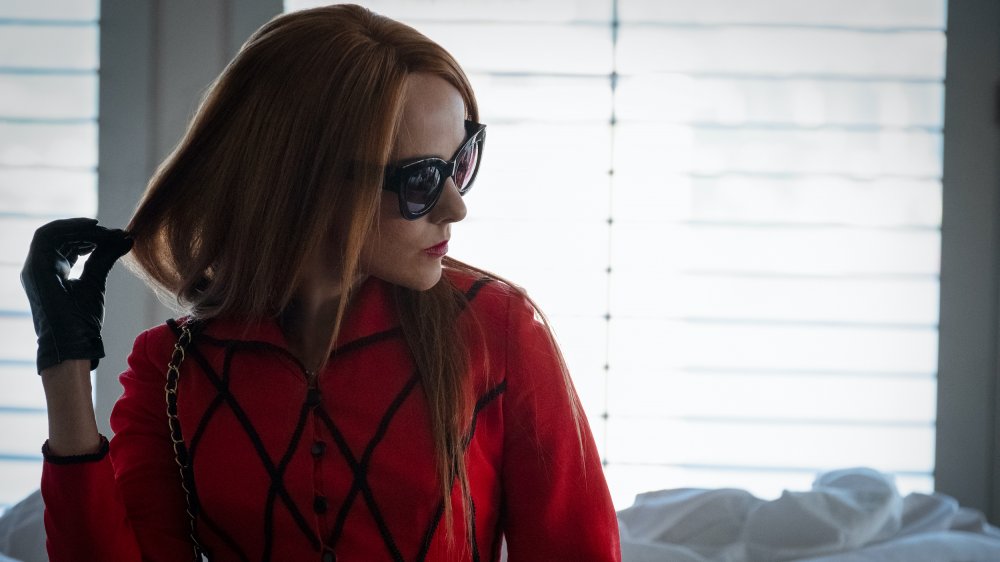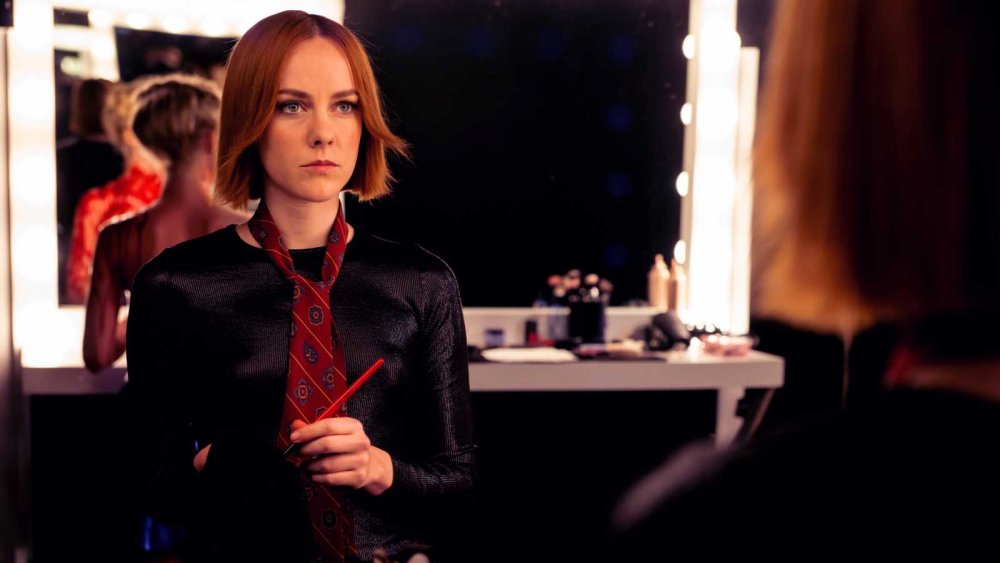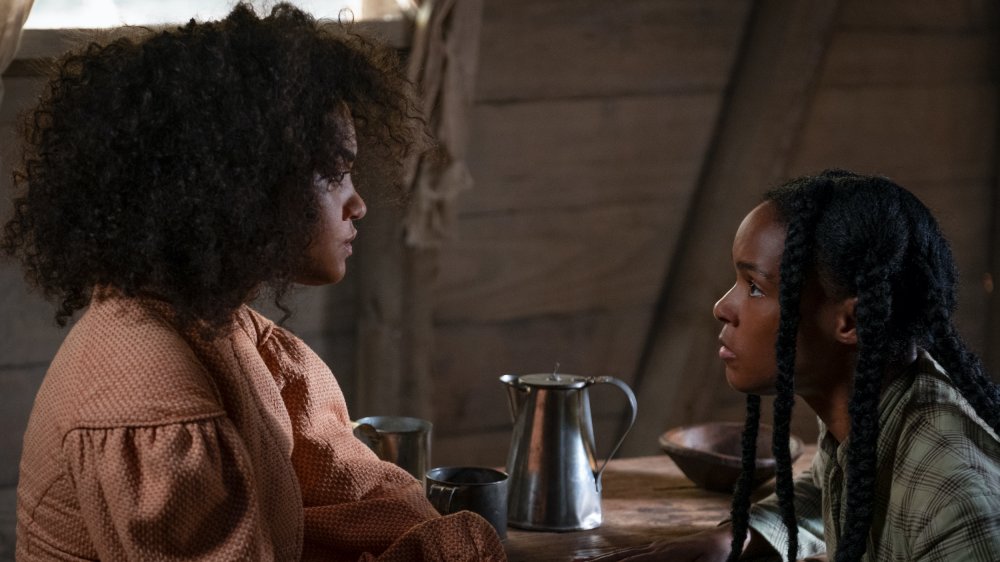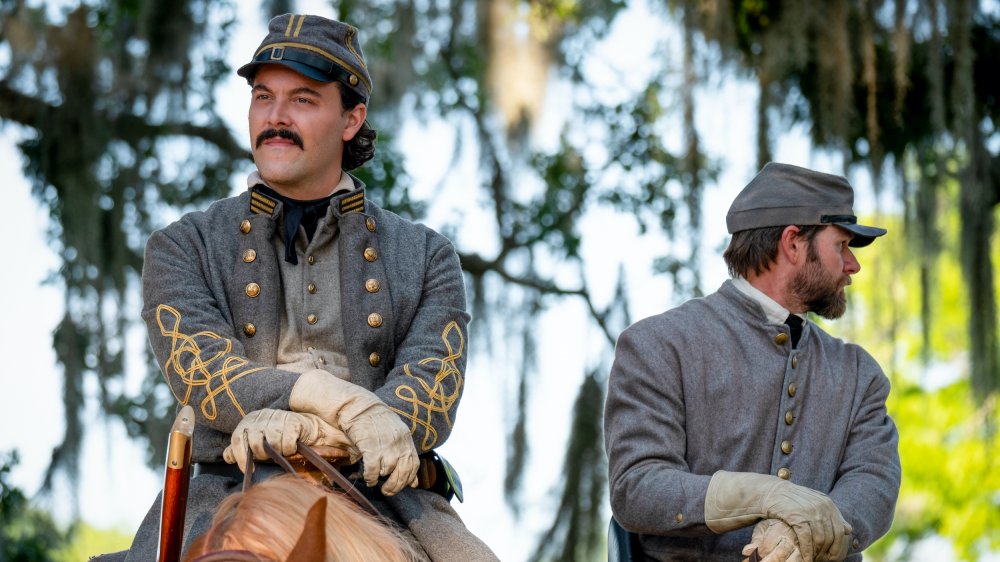Jena Malone Talks Antebellum, Policing, Childhood, And More - Exclusive Interview
Horror thriller Antebellum draws a thought-provoking and emotional through line between the radical injustice of America's past and the ongoing struggle of today, with singer Janelle Monáe as its heroine. Jena Malone appears as a Confederate matriarch in the movie's Southern plantation scenes, and as a mysterious businesswoman in the present. The feature film debut from director duo Gerard Bush and Christopher Renz arrived on on-demand and streaming services on September 18, 2020, with a startling narrative surrounding slavery that captivated Malone within the screenplay's first few pages.
As she explained in this exclusive Q&A with Looper, she's chosen stories with something important to say since she was a girl. This dedication continued into adulthood, as evidenced by her participation in films like Saved! (a Sundance favorite send-up of modern evangelicalism), Neon Demon (a controversial shocker dealing with materialism and cultural perceptions of beauty), and the Hunger Games franchise, set in a dystopian world defined by the stark disparity between the haves and the have-nots. Antebellum is just the latest example of Malone's drive to find films with meaning.
Jena Malone never thought that storytelling was supposed to be easy
I was thinking about Saved!, Neon Demon, The Hunger Games, Antebellum, and this habit that you have of choosing roles in these films, in different genres, that are all about things that are not only incredibly topical but things that have coalesced into being important at this moment we're in right now. What is it about you as a performer and as a person that draws you to these types of stories?
It's a good question. It's one that actually has been on my brain recently, so I'm glad that you asked that because I was kind of looking back. And in this film, for Antebellum, I've been asked a lot about playing the villain, right? And sort of having to embody a space that is inherently evil. How vile that is to have to do that. But then I was like, "Huh, I've been playing a few villains lately. And then what was before that?" I don't really have a full answer, [however] the hunch that I have is that [it's because] I was raised in a very untraditional way. I started acting when I was 10 years old, and I just never in my mind thought that storytelling was supposed to be easy. Storytelling felt like something that was honorable work, that it was work about discovering and helping people that didn't have stories. I was raised in a kind of a different way where I had two mothers who were lovers and we were living in our car and —
And you lived in 20 plus places.
Yeah. I mean, we were sort of below middle class for sure. We were even sort of "unhoused residents" in a few spaces of my life. I think that maybe just having that lens of the world that felt [like] less of a bubble and more like I had been given the gift of an awareness of what we perceive or verbalize as marginalized experiences. Those marginalized experiences were things that felt really important for me to tell.
And I remember even when I was younger, I told my mom I didn't want to go out on auditions for commercials anymore because it felt so dehumanizing. I didn't want to sit in a space and pretend to like cereal. I was like, "I want to [embody] and tell a story where it's going to make you feel something." And this was at 10, so I don't know what kind of trip I was on at that age. I think I'm actually much less responsible now or whatever. I think it was just the gift and I think it is a gift that you can give to your children, which is more of a wider lens to view humanity, instead of a bubble that sort of protects their perceived fragility.
Why Antebellum is so important right now
For anyone who thinks Antebellum is too on the nose, there are pundits right now equivocating on slavery. If we've lost the baseline agreement that slavery was horrible, it's more important than ever to tell these stories.
There's a space where films are these myth makers, right? They help us alchemize our experience here on this planet. The biggest gift for me, from having a child, is realizing how deeply they use their imagination to alchemize humanity. Sometimes they're not even being empathetical to themselves, but then they create a story that helps them understand how they fit into that story. Imagination is one of the most powerful things that we own and possess. It can change the legislative government. It's even in children's books. It's starting there. And these are just stories. They're just simple stories. It helps us alchemize the human experience. Sometimes we need to turn our fear into a villain to understand it. And sometimes we need help turning our courage into a heroic event. Because sometimes it doesn't feel so courageous all to ourselves, you know? I think the reason why Antebellum is so important, right now, it's sort of poetic in every single way. It fits so perfectly for this watershed moment that we're all experiencing, but also films are bridgework. It helps us get from one place to another. I think this is such an important time to have a very clear, well-understood bridge from our past to where we are now. Even just in the examination of slavery, I love that we're finally talking about how the police system, and the criminal justice system were so tied to the beginning –
It's how it started! It's where they came from.
Exactly. And those ideologies built these systems that we're still interacting with, funding, and supporting today.
This movie gets described a lot, from the first time it was announced even, as a "surprise horror film." How do you, as someone in the movie, talk about a movie like that? And how would you recommend those of us who want to tell our friends about it describe the movie? How do you navigate that?
I don't know. I find it easier to talk about a psychological thriller for me, just in that sense, because sometimes I find calling something a horror film, particularly in this when you're talking about chattel slavery and the Antebellum South, and it was already such a horror show. I feel like it's not enough to just call it "horror" sometimes, you know? It's much more in the sort of psychological thriller in that you don't know what's happening. But those are the best movies! I mean, I love it when someone's like, "I can't tell you, just watch it." That's kind of the best way to describe this.
"Go into this cold. Don't let anyone tell you anything."
Yeah, don't even watch the trailer. But I do think I can watch this again, even after knowing what happens, and still find interesting things, you know what I mean? It's a good story. It's just good filmmaking. And that's a pleasure no matter whether you've read the whole script or it's completely new to you.
Oh, yeah. From The Sixth Sense to Get Out, or even The Avengers films, knowing the secrets doesn't make it any less incredible. Sometimes, it even makes it more fun to watch.
It makes it [even] more enjoyable, I think.
What Antebellum may have in common with Donnie Darko
Lastly, what's next for you after this? What do you have coming up? I mean, obviously everything's on hold, but in a perfect world...
Not everything. I mean, we're revolutionizing how films are shown in the world. It doesn't have to be perfect. It can be a sheet on your wall. It can be from your phone in your car. It can be on your TV screen. I mean, there are ways. Now is the time we need stories to help us translate, compute, empathize. Whether it's like drive-ins, on the boat, in your car, in the mall. I don't really care at this point.
I think it's actually really kind of punk rock to say all of that doesn't matter. The only thing that matters is that we continually use storytelling to elevate our human experience. So, however we can get people to watch this, however we can get [to] this audience, let's do that. And, of course, it's going to change. This crazy pandemic [is] sort of making everything revolutionize right in front of us. I don't have any complaints about that.
I feel like also films have such an eternal shelf life. They still play Donnie Darko at a giant cinema!
Yes they do.
This film will be seen in large cinemas. It's that important. It's going to be on the big screen eventually, and it will be in Europe and the over 1700 screens that are open in North America.
I think it's just like the Wild West. Let's just do it and see how it feels, because it's that important, you know?



